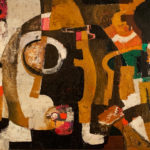Biography
Sam Middleton (1927-2015) was one of the leading 20th-century American artists living and working in the Netherlands. A mixed-media artist, whose choice medium was collage, Middleton grew up in Harlem at the height of the Harlem Renaissance. He was immersed in the vibrant cultural and musical scene of the era, becoming acquainted through performances at the Savoy Ballroom with jazz music, which would remain a primary influence on his art throughout his career.
Middleton left New York briefly at the height of World War II, joining the Merchant Marines in 1944 when he was just 17 years old, but returned to his native city in the early 1950s. He immersed himself in the growing artistic scene of Greenwich Village and the Lower East Side. Middleton initially frequented the Cedar Tavern and formed close friendships with New York School artists including Franz Kline, Jackson Pollack, and Robert Motherwell. His circle of beat writer and artist friends soon gravitated to The Five Spot Café on the Lower East Side where jazz greats Cecil Taylor, Thelonious Monk, John Coltrane, and Charlie Parker performed nightly. During this decade, jazz, the music that so inspired him, was changing. Compositions were never played the same way twice. Musicians emphasized improvisation, spontaneity, and creativity of sound. Middleton found inspiration in this new sound and worked to find his own creative voice. He said: “For me, improvisation is a galaxy of color. When I listen to music I feel like a soloist.” In his search to “paint sounds” Middleton was challenged by the changing tempo, the hint of melody, and the speed and dexterity of the music.
In 1955, Middleton made his first artistic trip outside of New York. Following the lead of other African American artists such as Charles White and Elizabeth Catlett who were in search of a more open-minded atmosphere than pre-Civil Rights United States, Middleton settled briefly in Mexico City. He had traveled there under a grant from the John Hay Whitney Museum that Franz Kline had helped him secure. In Mexico City, Middleton began working in collage and transforming his artistic viewpoint from social realism to expressionism. He had his first one-man exhibition in Mexico City in 1957. By 1959, Middleton had left the United States permanently. He moved to Spain, then Sweden and Denmark, before finding his permanent home in the Netherlands, settling in Schagen in January, 1962. He began teaching (at Atelier 63, the Royal Academy of Art in Hertogenbosch) and exhibiting regularly, with exhibitions across Scandinavia through the 1960s, 70s, and 80s, and, more recently, a retrospective at the Cobra Museum voor Moderne Kunst in 2003.
His circle of friends – a considerable group of African American expatriates living in Europe – included Herbert Gentry, James Baldwin, and Ted Joans, among others. Although Middleton never returned to live in New York, he continually drew upon his youthful memories of Harlem and the lively Greenwich Village music, literary, and art scene. In his later works he expanded his themes to incorporate his Dutch surroundings and embraced a larger body of music.
Middleton’s work is included in American museum collections including the Whitney Museum of American Art, Fisk University Galleries, the Hampton University Museum, and the Howard University Museum. His work is further included in international museum collections in Australia, Israel, and The Netherlands, including the Stedelijk Museum in Amsterdam and Venlo’s Van Bommel Van Dam Museum. His collages were included in the pivotal 1962 exhibit at the Whitney Museum, Forty Artists Under Forty, and, twenty years later, in the Studio Museum’s exhibition An Ocean Apart: American Artists Abroad. His work continues to be shown in major exhibitions in both the United States and Europe, including the Whitney Museum’s 2015 exhibition America Is Hard to See. Every scholarly publication on African American art after the War mentions Middleton’s elegant and lyrical collages.

 Impressions
Impressions